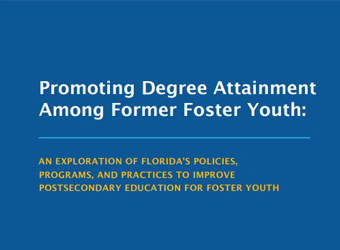 Helios Education Foundation recently partnered with Educate Tomorrow to publish a brief titled, “Promoting Degree Attainment Among Former Foster Youth: An Exploration of Florida’s Policies, Programs, and Practices to Improve Postsecondary Education for Foster Youth.”
Helios Education Foundation recently partnered with Educate Tomorrow to publish a brief titled, “Promoting Degree Attainment Among Former Foster Youth: An Exploration of Florida’s Policies, Programs, and Practices to Improve Postsecondary Education for Foster Youth.”
On May 20, Kathy McDonald, FCAN’s Assistant Director for Network Partnerships, was joined by guest presenters Paul Perrault, Vice President of Research and Evaluation for Helios Education Foundation, and Brett McNaught, CEO of Educate Tomorrow, for a webinar that covered some of the highlights from the report, including an overview of the policy landscape and examples of Florida colleges and universities supporting former foster youth.
Foster Youth in Florida
Each year, approximately 1,000 youth in Florida turn 18 and age out of foster care.
Although Florida policies and programs are working to better support this segment of the student population, youth in the foster care system still enroll and graduate from college at much lower rates than other students.
One significant factor could be figuring out how to mobilize students: a poll of the webinar audience — comprised of higher ed, community organization, and philanthropy leaders — revealed that one of their biggest challenges is getting students to take advantage of the supports that are available.
Where can Florida Foster Youth Find Support?
Students aren’t the only ones who might not be aware of all the resources at their disposal; many higher ed professionals don’t know that foster care alumni qualify for tuition and fee waivers, as well as stipends for living expenses.
The webinar outlined three key pieces of legislation that support foster care alumni in pursuing their postsecondary education.
- Under Chapter 1009 of the Florida Statutes, former foster youth may be exempt from payment of tuition and fees until age 28.
- Florida DCF’s Postsecondary Education Services and Support (PESS) program provides a $1,256 stipend for living expenses to students enrolled in a postsecondary or vocational school up to age 23.
- Florida Statute 409.1452 mandates the State University System of Florida (SUS) and the Florida College System (FCS) provide campus coaches for current and former foster youth at their institutions.
Foster Youth Education Attainment On the Rise
Florida’s colleges and universities have seen consistent increases in enrollment and graduation from students using the DCF tuition exemption throughout the past decade. At SUS institutions, the number of students using the DCF tuition exemption increased from 785 in the 2015-16 academic year to 1,182 in the 2017-18 academic year.
Still, more work is needed to help these students complete their education with wraparound supports. Two factors that are compounding progress are gaps in data tracking and inconsistencies related to the processes of utilizing tuition and fee exemptions from campus to campus.
Brett shared that one of Educate Tomorrow’s strategies involves getting former foster youth to begin college the summer following their high school graduation, which allows them to get a jump on earning credit and acclimating to life on campus.
What’s Next?
Positive Pathways was created to help build a network of campus leaders who support foster care alumni by sharing best practices through a monthly affinity call. The organization’s annual conference will take place May 30-31 at St. Petersburg College. Learn more about the conference and register today.
Show Notes
To learn more about supporting postsecondary education success for former foster youth — or to view the webinar and download the presentation — take advantage of these resources.
Recording
Slides
Brief — Promoting Degree Attainment Among Foster Youth
Be sure to visit our Past Webinars page for access to recordings and downloadable material from FCAN’s previous presentations.
